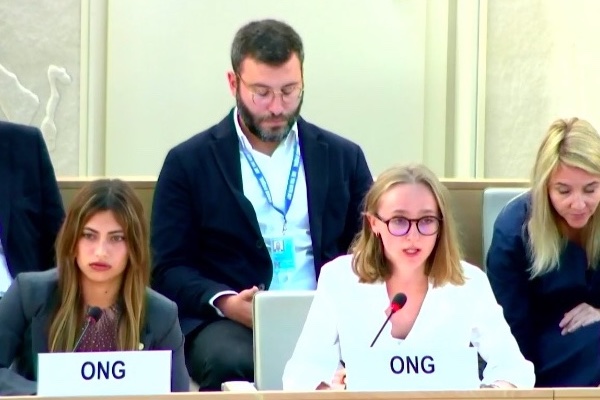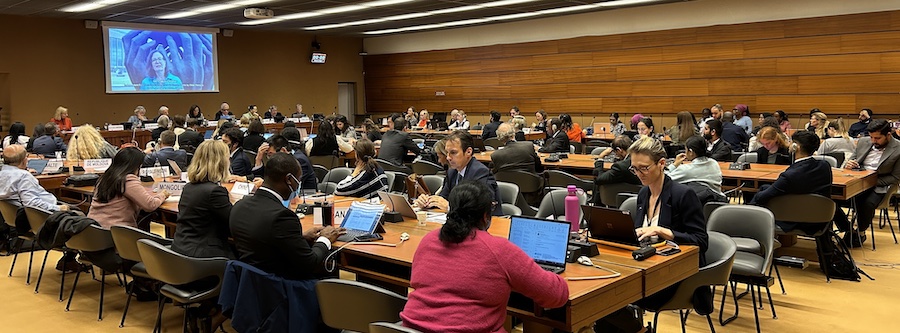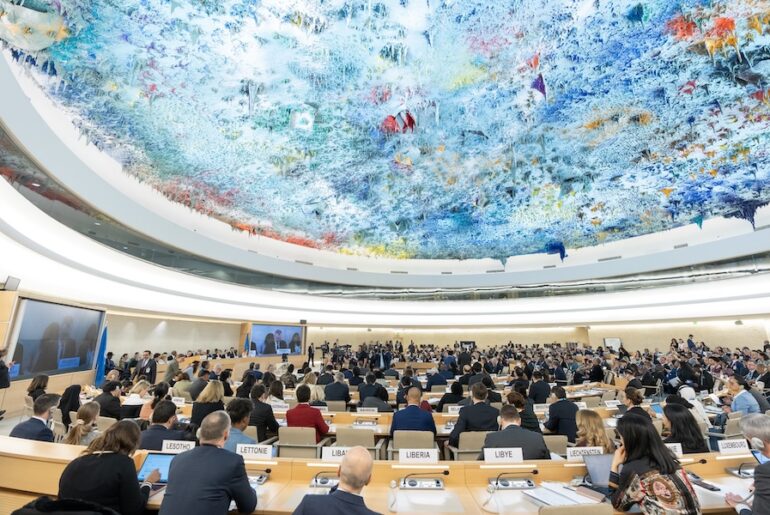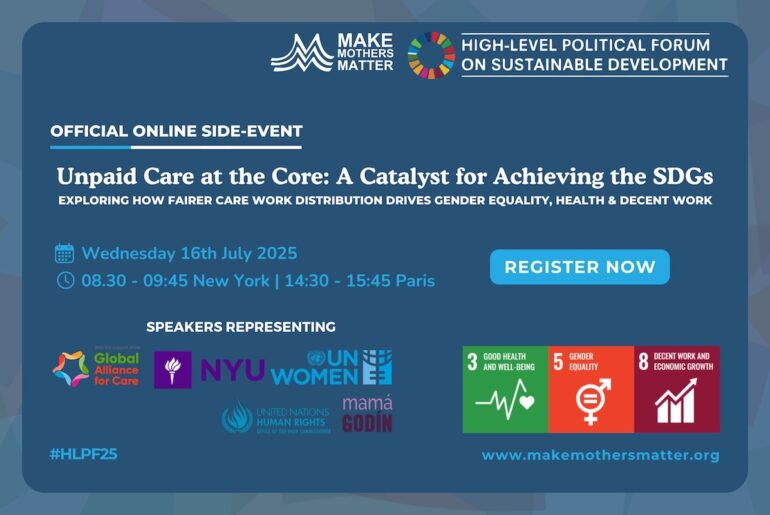Mothers’ voices at the Human Rights Council
07.10.24
UN Geneva - As the 57th session of the Human Rights Council (9 September-11 October) wraps up, we take a look back at our contributions in bringing the perspective of mothers to multiple discussions that took place: the right to water, the right to development, the role of education for peace, as well as the protection of the human rights of family members.

MMM Oral statements to the Human Rights Council
The MMM UN team, including Manon Robin (pictured above), Mélanie Nédélec and Valerie Bichelmeier, delivered 5 oral statements – summarised below.
Commenting on the report of the Special Rapporteur on the right to water and sanitation on the water and economy nexus, we drew attention to the invisible economy of fetching water, a drudgerous task mainly performed by women and girls, which adds up to their already disproportionate share of unpaid domestic and care work.
1.8 billion people still live in households without running water on the premises. In most cases, it is women and girls who are responsible for collecting this precious commodity. Worldwide, they spend a staggering 200 million hours doing so each day.
We called on governments
- to take this invisible economy of water into account, and prioritise investments in infrastructure to ease the burden on women and girls and realise their basic right to clean water and sanitation
- to include a gender perspective in water management and involve women at every level.
![]() Read the full statement
Read the full statement
MMM also commented on the report of the Special Rapporteur on the Right to development of children and future generations, noting that the report fails to recognise the vital role mothers play in raising the adults of tomorrow.
We therefore joined the call to invest significantly in child development, in particular early childhood development, but also in the mothers behind the unpaid work of educating and caring for children. The right of every child to an adequate standard of living supposes that mothers also attain such a standard.
![]() Read the full statement
Read the full statement
Participating in the discussion following the panel on Quality education for peace and tolerance for every child, we highlighted the power of Early Childhood Care and Education in building sustainable peace.
The case for investing in services to foster a nurturing care environment for Early Childhood Development (ECD) makes both economic and social sense. We therefore called on governments to invest in universal ECD services, including education and support for parents – mothers in particular – as the best investment a country can make for sustainable peace and development.
![]() Read the full statement (supported by our partner the Early Childhood Peace Consortium)
Read the full statement (supported by our partner the Early Childhood Peace Consortium)
In the HRC Panel event on the Implementation of States’ obligations on the role of the family in supporting the human rights of its members, we drew attention to the case of single mothers families, where mothers shoulder alone the unpaid and time-consuming – yet vital – work of caring for and educating their children, juggling to maintain the household while earning an income.
We called upon governments to develop family support policies that address the specific challenges and needs of single mothers in the various aspects of their and their children’s lives. These policies should promote single mothers’ economic and social rights, including their right to an adequate standard of living, right to education, right to work and to social security, as well as their children’s right to be cared for in a nurturing family environment.
![]() Read the full statement
Read the full statement
Lastly, we took the opportunity of the General Debate on the Promotion on economic, social and cultural rights to highlights the key messages of the side-event we organised on the margins of the High Level Political Forum, Mothers, unpaid care work and crises – connecting the dots. This event pinpointed the links between today’s multiple global crises and women’s unpaid care work.
Our current economic system fuels inequalities and fails to appropriately respond to the challenges of our time. The debt crisis precipitates societies into social crises. When priorities shift from providing public services to debt servicing, mothers pay the highest price. When austerity policies reduce investment in healthcare, education or social protection, mothers have to adapt and perform the work public services no longer provide. Environmental degradation and climate change also increase the unpaid work of caring. […]
It is time for a systemic transformation of our economic system. Care must be at the heart of our response to all our challenges.
Read our full statement

Mélanie Nédelec, MMM UN representative, delivering a Statement at the 57th session of the Human Rights Council
Other activities
MMM co-sponsored two side-events on Achieving climate justice for children in the context of loss and damage, and Legal capacity in older age. We also supported the organisation of the high level event marking the International Day on Older Persons on 1st October.
Last but not least, we followed and participated in the negotiations of several Human Rights Council Resolutions and were able to influence the language on unpaid care and domestic work in the resolution on the human rights to safe drinking water and sanitation.

Envisioning care as a common thread to global crises
29.07.24
UN New York - Our virtual HLPF side-event brought together experts to shed light on how the various global crises we face (in particular climate change and other environmental crises,
We call for multi-stakeholder approach to recognise and support unpaid care work
21.07.24
UN New York - Participating in the meeting of the UN Economic and Social Council (ECOSOC) on care and support systems, MMM reaffirmed the principle of co-responsibility, which should underpin
The New EU Gender Equality Roadmap : A Call for Inclusion of Mothers
04.03.25
The European Commission’s initiative on a new Gender Equality Roadmap post-2025, marks a significant step forward in addressing gender disparities across the European Union. Make Mothers Matter (MMM








